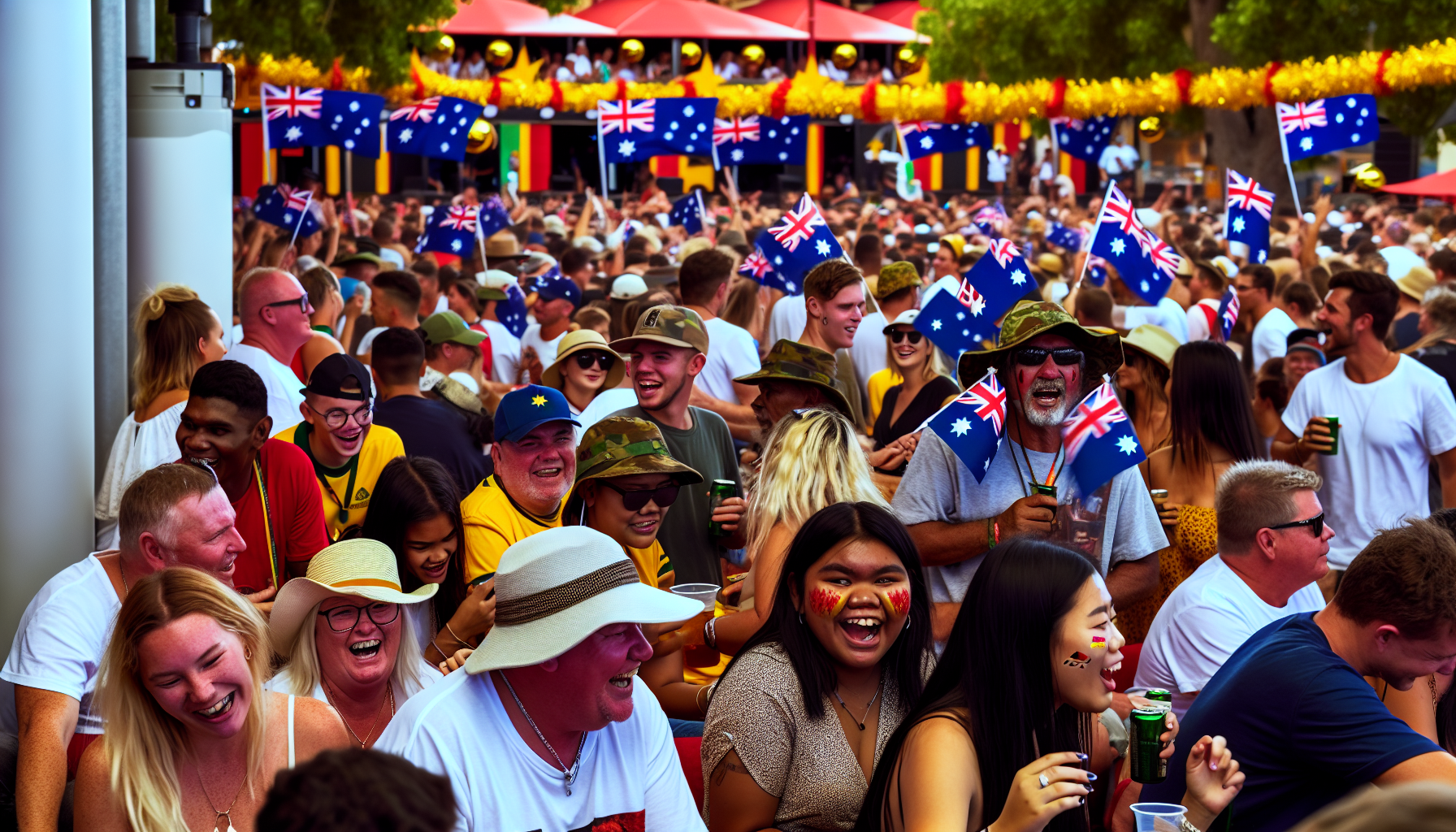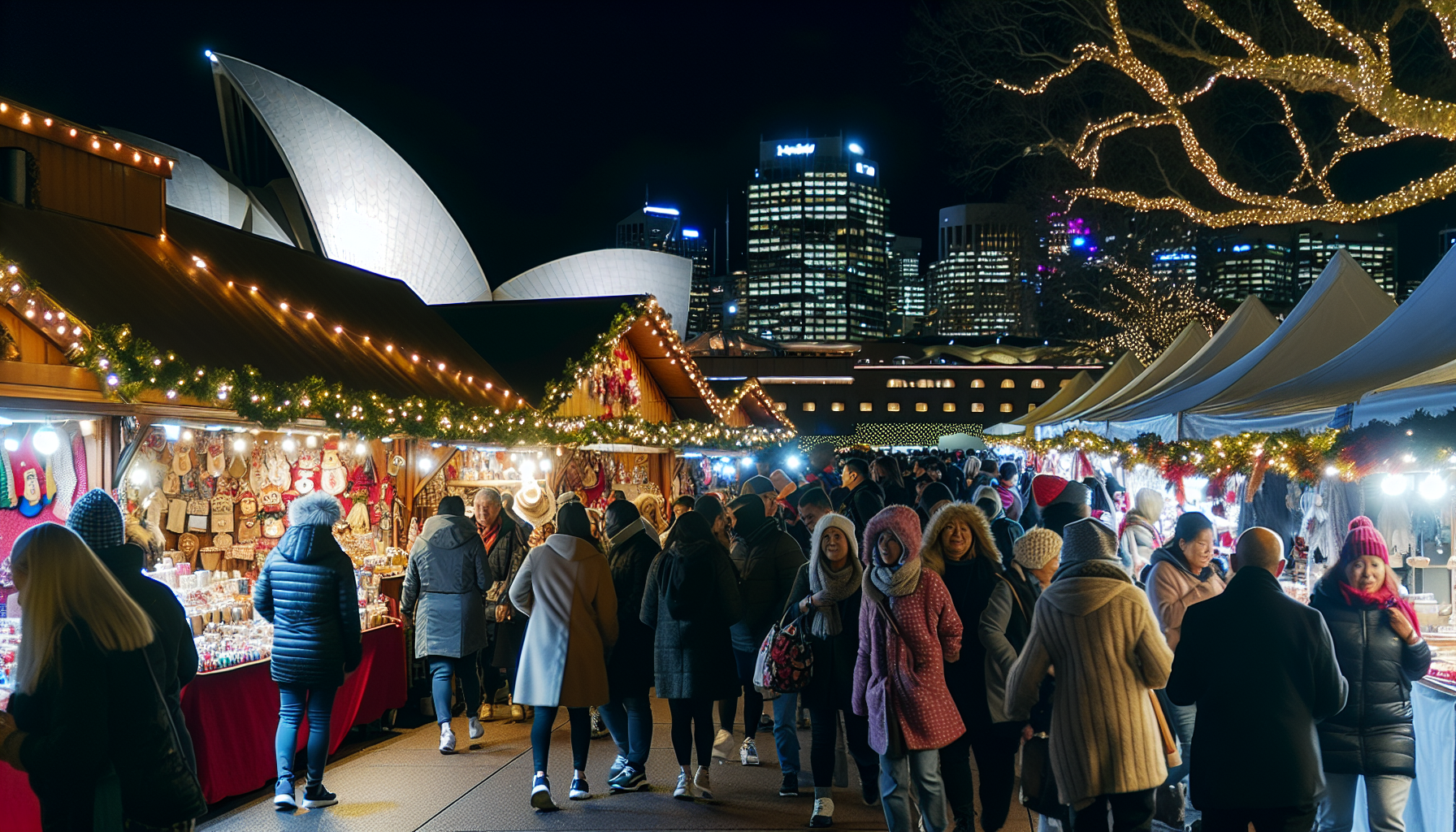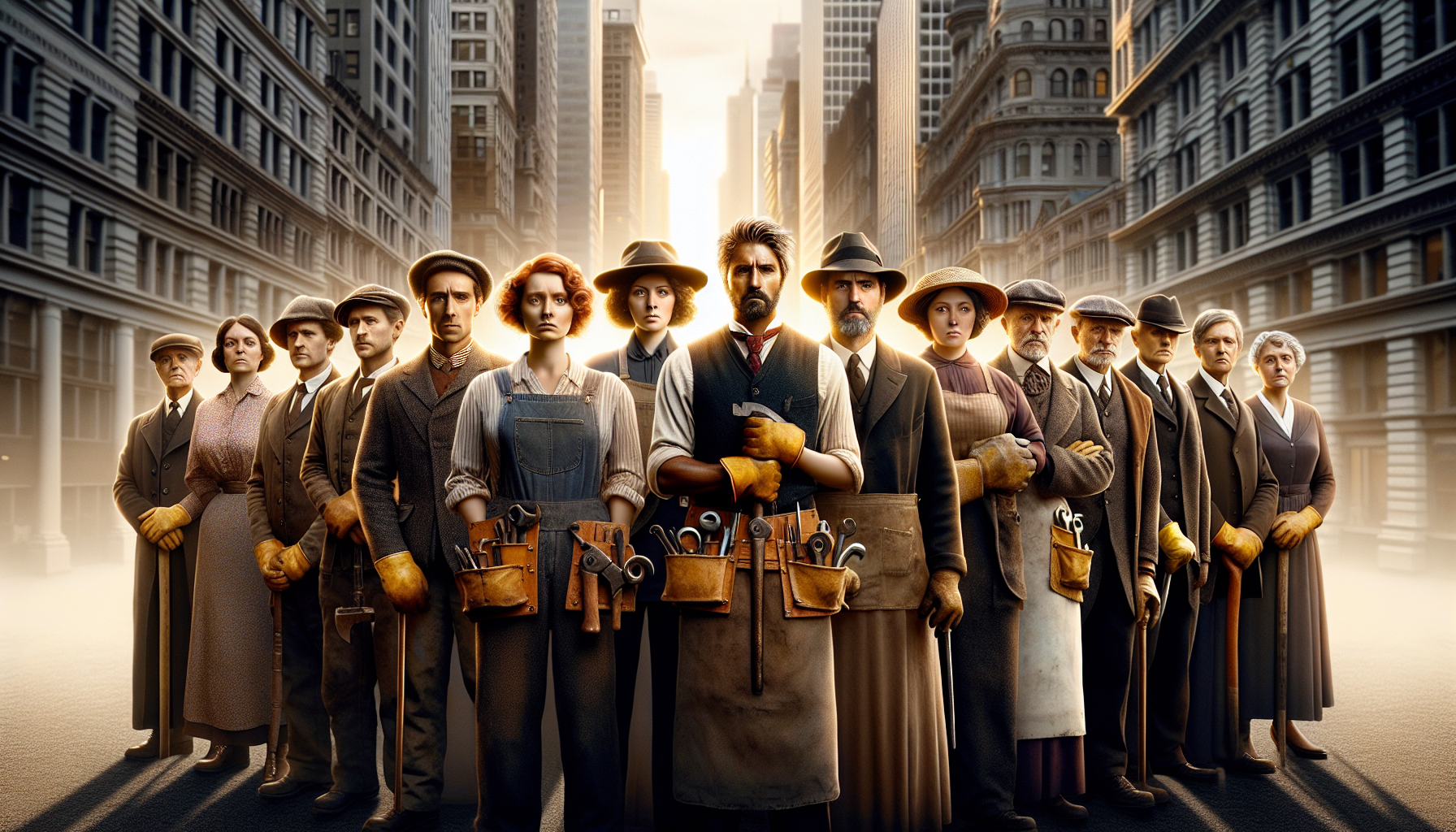Complete Guide to Holiday Australia: Celebrate Down Under in 2024
Exploring the diverse “holiday Australia” has to offer? From the nation-wide celebrations of Australia Day to the personal reflections of ANZAC Day, this guide details the unique public holidays that form the Australian year. Learn how each holiday contributes to Australia’s national identity and how you can partake in the festivities or navigate the changes they bring to daily life.
Key Takeaways
-
Australia Day on January 26th is a national holiday celebrating cultural diversity and unity, marked by events like the Sydney Harbour boat races and formal ceremonies in Canberra.
-
Easter in Australia features a blend of religious observance and unique traditions such as chocolate bilbies for conservation, with the Easter long weekend being popular for travel to destinations like the Great Ocean Road or Uluru.
-
ANZAC Day on April 25th is a solemn day of remembrance for Australian and New Zealand forces, observed with Dawn Services, parades, and various commemorative events across the nation.
Celebrating Australia Day: Honouring the Nation

Every year on Friday 26 January, Australians come together to celebrate Australia Day, a day that marks the rich cultural diversity and shared history of the nation. It’s a day to reflect on the contributions of Australians, past and present, and to come together in a celebration of unity and national pride.
From community awards and citizenship ceremonies to outdoor concerts and family gatherings, Australia Day is a vibrant display of the Australian spirit.
The Significance of 26 January
You might wonder, why is 26th January chosen as Australia Day? The date holds a significant place in Australian history, marking the landing of the First Fleet at Sydney Cove in 1788. It was on this day that the Union Flag was raised, and British sovereignty over the eastern seaboard of Australia was proclaimed. The first official celebration took place in 1818, but it wasn’t until 1935 that the term ‘Australia Day’ was adopted by all Australian states and territories.
Nowadays, Australia Day doubles as the official national public holiday, honouring both the historical event and the spirit of Australia along with the contributions of its citizens.
Australia Day Events and Activities
Australia Day is the largest annual civic event in the nation, marked by a broad array of public celebrations. Some of the activities include:
-
Sydney Harbour’s boat races
-
Vibrant ferry race
-
Melbourne’s multicultural celebrations
-
Sydney’s WugulOra Morning Ceremony, honoring the enduring cultures of Aboriginal and Torres Strait Islander peoples
Australia Day is a feast of activities that are inclusive and celebrate the diversity of the nation.
Meanwhile, the Australian government organizes a formal national ceremony in Canberra, including a flag-raising and a citizenship ceremony along with a traditional Indigenous smoking ceremony, as part of the royal national agricultural celebrations.
Navigating Public Holiday Schedules
As with any public holiday, Australia Day impacts regular schedules. Here are some changes you can expect:
-
Non-essential government offices and many businesses close
-
Retail businesses may have restricted trading hours
-
Public transportation may operate on an altered schedule
For employees working on a bank holiday, there could be compensation through additional pay or alternative leave, adhering to the terms set within awards, enterprise agreements, or individual contracts.
Easter Holidays in Australia: A Time for Tradition and Travel

As we navigate through the calendar year, we encounter another significant public holiday in Australia – the Easter long weekend. Easter in Australia is a time of tradition and travel, providing a popular break from work and school. But Easter Down Under isn’t just about chocolate eggs and bunnies; it’s a unique blend of religious observances, community traditions, and a much-anticipated opportunity for a mini-vacation.
Good Friday to Easter Monday
Easter Weekend, followed by Easter Tuesday, includes the following days:
-
Good Friday (Friday 29 March): a day of mourning for Christians, commemorating the crucifixion of Jesus Christ
-
Saturday before Easter Sunday: a day of anticipation and preparation for the upcoming celebration
-
Easter Sunday: a day of joy and celebration, marking the resurrection of Jesus Christ
-
Easter Monday: an extended celebration and national public holiday, often used for travel and leisure activities
Both Good Friday and Easter Monday provide opportunities for relaxation and enjoyment during a well-deserved recreation day.
From observing traditional fasts to attending church services for spiritual renewal, Australians observe these days in various ways. One popular tradition is the consumption of hot cross buns on Good Friday, symbolizing the end of Lent.
Easter Traditions and Customs
Easter in Australia has its own unique customs and traditions. Some of these include:
-
The Easter bunny, a symbol of new life
-
The native bilby, an endangered species, featured in chocolate form
-
The sale of chocolate bilbies to aid in their conservation
These customs add a uniquely Australian twist to Easter celebrations.
On Easter Monday, Australians engage in popular traditions such as Easter egg hunts, and festive gatherings featuring large meals and public entertainment are common.
Planning Your Easter Getaway
The Easter long weekend serves as an excellent occasion for Australians to plan a getaway. Australia offers diverse destinations to fit any traveler’s preferences, including:
-
The scenic Great Ocean Road coast
-
The spiritual experience of Uluru
-
An urban escape in Sydney
-
A tranquil beach setting in Byron Bay
-
The pristine wilderness of Freycinet National Park in Tasmania
There’s a perfect Easter getaway waiting for you.
The Spirit of ANZAC Day: Remembrance and Respect
On the 25th of April, Australia commemorates ANZAC Day, a day of remembrance and respect for the Australian and New Zealand forces who served in the Gallipoli campaign during World War I. More than just a public holiday, ANZAC Day stands as a solemn occasion that pays tribute to the sacrifices made and the spirit of those who served.
Understanding ANZAC Day
ANZAC Day commemorates a significant event in Australian and New Zealand history - the first major military action by the Australian and New Zealand Army Corps (ANZACs) during the First World War. The day marks the landing at Gallipoli, Turkey, on 25th April 1915, and it was officially observed on the same date a year later.
Today, ANZAC Day embodies the ‘Anzac tradition’ and values of courage, endurance, and mateship, remembered and celebrated in various commemorative events.
Participating in Commemorative Events
On ANZAC Day, Australians honor the memory of their fallen soldiers through various commemorative events and traditions. Ceremonies start with the Dawn Service, followed by ‘gunfire breakfasts’, the ANZAC Day March, wreath-laying, and the recitation of the ‘Ode of Remembrance’. Attendees can play an active role by wearing rosemary, laying wreaths or flowers, as well as participating in responsive readings and observing moments of silence.
For those who can’t attend services, the televised national events like the Dawn Service offer a way to participate from any location.
King's Birthday Public Holiday: A Royal Celebration
Amidst the Australian winter, the King’s Birthday public holiday introduces a hint of royal celebration. Celebrated on the second Monday in June, this holiday recognizes the official birthday of King Charles III, despite his actual birthday occurring in November. This tradition of altering the date arises from the aspiration for favorable weather conditions for celebrations in the United Kingdom.
The History Behind the King's Birthday
The celebration of the sovereign’s birthday dates back to 1748 in the Kingdom of Great Britain. This day was originally celebrated on the actual birthday of the monarch until 1936. Since then, the date on the second Monday in June was adopted in Australia to ensure favorable weather for ceremonies in the Northern Hemisphere.
The King’s Birthday is an opportunity to celebrate the contributions of Australians, with the King’s Birthday Honours List recognizing individuals in various fields and volunteers.
How Australians Celebrate
The King’s Birthday public holiday creates a long weekend for most Australians, which is marked by a variety of festivities and events. Annual Australian rules football games are a highlight of the King’s Birthday in Victoria, attracting local sports fans to the events.
The long weekend offers time for sporting events and an opportunity for Australians to engage in family activities and community gatherings.
Christmas and Boxing Day: Festive Cheer Down Under

As the year comes to an end, Australians prepare for a uniquely festive season. Christmas in Australia is a unique affair, marked by summer sun and outdoor celebrations.
And then comes Boxing Day, a day for social outings and relaxation. You might wonder, how are these holidays celebrated by Australians? Let’s delve into the festive merriment Down Under.
Christmas Day and Boxing Day Traditions
On Christmas Day, Australians often indulge in informal meals with family, a tradition originating from the times when servants would take the following day, 26 December, off. Boxing Day, on the other hand, is marked by social outings, with cinemas releasing blockbuster movies and offering midnight screenings for highly anticipated films.
A highlight of Boxing Day sports is the Boxing Day Test Match, as well as the esteemed Sydney to Hobart Yacht Race, both drawing large numbers of spectators and participants.
Public Holiday Essentials
Throughout the festive season, staying mindful of public holiday schedules is crucial. Here are some important details to keep in mind:
-
On Christmas Day, major supermarkets are closed, but most reopen on Thursday 26 December, Boxing Day.
-
Specialty stores and shopping centres also close on Christmas Day but open for the Boxing Day sales.
-
Public transport services run on limited schedules on Christmas Day, requiring travelers to check with local transport authorities for specific timetables.
Part-day public holidays are observed in South Australia and Northern Territory for Christmas Eve and New Year’s Eve from 7 pm to midnight. These special holidays allow residents to enjoy the festive evenings with their loved ones.
Welcoming the New Year: Celebrations Across Australia

The transition into the new year invites global celebrations, and Australia certainly partakes in this joyous occasion. Being one of the first countries to welcome the New Year due to its proximity to the International Date Line, Australia kicks off global celebrations with grandeur. From breathtaking fireworks to festive events, let’s discover how Australia welcomes the New Year.
New Year's Eve Festivities
New Year’s Eve in Australia is marked by extraordinary celebrations. Sydney’s New Year’s Eve is renowned for its impressive display of fireworks and pyrotechnic effects. Melbourne, on the other hand, complements its vibrant fireworks with a laser show from rooftops across the city.
With large crowds gathering in the city centres, early arrival is recommended to secure a spot. For those who prefer a more relaxed celebration, many hotels and venues offer accommodation packages that include overnight stays along with festive celebrations.
New Year's Day Relaxation
Following the exhilaration of New Year’s Eve, New Year’s Day presents an opportunity to relax and decompress. Whether it’s a family day at the beach, a picnic in the park, or a barbecue with friends, Australians make the most of the public holiday to enjoy the summer weather and start the year on a high note.
Labour Day: Recognizing Workers' Contributions

Labour Day in Australia, beyond being a public holiday, serves as a day that acknowledges the rights and contributions of workers. Celebrated on different dates across Australian states and territories, Labour Day commemorates the achievement of the eight-hour working day, a milestone in Australian labor history.
The Eight Hours Movement Legacy
Labour Day in Australia originated from the union movement’s campaign for better working conditions, culminating in the eight-hour workday. This victory not only improved the lives of workers but also influenced labor movements worldwide. From enduring harsh working conditions of up to 14 hours a day to achieving the eight-hour workday, the movement led to significant changes in working conditions.
Today, the Eight-Hour monument in Melbourne and the iconic number eight on union buildings stand as reminders of this historic achievement.
Labour Day Today
Today, Labour Day remains a significant day for solidarity among workers worldwide, highlighting ongoing efforts and struggles for fair work conditions.
In Australia, Labour Day is often a part of a long weekend where people relax, spend time with loved ones, enjoy sports, and partake in barbecues. Many plan trips to scenic destinations during Labour Day, engaging in activities like picnics, bushwalking, and camping.
Unique State-Based Holidays: Local Flavours of Celebration
Every Australian state has its own unique public holidays, offering a taste of local culture and traditions. From the Adelaide Cup Day in South Australia to the AFL Grand Final Friday in Victoria, these state-based holidays are a celebration of local pride and community spirit.
Celebrating State Pride
Local public holidays in Australia have significant cultural importance, each reflecting the unique identity and traditions of its region. Adelaide Cup Day is a testament to South Australia’s enduring equestrian culture, symbolizing the state’s pride and sense of community through its historic horse racing traditions.
In Victoria, AFL Grand Final Friday is a public holiday that commemorates:
-
the state’s sports-driven community spirit
-
showcasing Victorian dedication to Australian Rules Football
-
highlighting local pride that goes beyond the sport itself.
What to Expect During State Holidays
During state holidays, Australia comes alive with a mix of activities. Adelaide Cup Day is a highlight during South Australia’s ‘Mad March’ with a combination of horse racing at Morphettville Racecourse and vibrant music and arts festivals. Victoria, on the other hand, celebrates Melbourne Cup Day with its own unique flair, while the state transforms during AFL Grand Final Friday with team-colored decorations and fans gathering in anticipation of the year’s biggest football game.
Beyond sporting events, state holidays offer different experiences like road trips, theatre shows, and fine dining in Melbourne and regional Victoria.
Navigating Australia's Public Holiday Calendar
Navigating Australia’s public holiday calendar might seem a bit complex, given the mix of national, state, and local holidays. But don’t worry; there are resources available to help you navigate Australia’s public holiday calendar. Whether you’re planning a trip or simply curious about these holidays, the list of 2024 public holidays across all Australian states and territories will come in handy.
State and Territory Holiday Variations
It’s crucial to realize that the observance of public holidays can differ across Australian states and territories. For instance, Labour Day is observed on different dates across the country. South Australia celebrates Adelaide Cup Day, a state-specific public holiday recognized for its popular appeal and contribution to tourism.
In New South Wales, Victoria, and Queensland, national public holidays include regular public holidays as well as unique occasions like Labour Day and the Royal Queensland Show. Local public holidays in New South Wales may be declared for special events, illustrating regional variations.
Contacting Local Authorities for Accurate Information
For the most precise information on public holidays, reaching out to local authorities in the respective Australian state or territory is recommended. Each state and territory has dedicated authorities that can be contacted for public holiday information. Whether you reside in:
-
South Australia
-
New South Wales
-
Victoria
-
Western Australia
-
The Northern Territory
-
The Australian Capital Territory
-
Tasmania
Rest assured that there are resources available to provide you with accurate information.
Summary
From the diverse celebrations of Australia Day and the unique Easter traditions to the solemn remembrance of ANZAC Day and the royal celebration of the King’s Birthday, Australia’s public holidays reflect the nation’s rich cultural tapestry. They offer a fascinating glimpse into Australia’s history, values, and community spirit. So, whether you’re planning to join these celebrations or simply learning about them, remember that each holiday carries a unique story, a celebration of identity, and an expression of unity. Here’s to experiencing the spirit of Australia, one public holiday at a time!
Frequently Asked Questions
Where to go in Australia for 5 days?
You can consider visiting Melbourne to Great Ocean Road, Outback Adventure in Uluru & Alice Springs, or South East Queensland in Brisbane & Gold Coast for a 5-day trip in Australia. These destinations offer diverse experiences and attractions.
Where is the cheapest holiday in Australia?
The cheapest holiday destination in Australia could be Katoomba in the Blue Mountains, Seal Rocks in NSW, Avalon in VIC, Gold Coast in QLD, Conondale National Park in QLD, Noosa in QLD, Devonport in TAS, or Pokolbin in the Hunter Valley, NSW. Whether you're looking for a beach vacation, national park adventure, or wine tasting experience, there are plenty of affordable options to explore.
What is Australia Day and why is it celebrated on 26th January?
Australia Day is celebrated on 26th January to commemorate the 1788 landing of the First Fleet, signifying the establishment of the first European settlement in Australia. It's a time to acknowledge the diverse contributions of Australians and celebrate national unity.
How is Easter celebrated in Australia?
Easter in Australia is celebrated with a mix of religious observances and community traditions. The celebrations begin with Good Friday, and continue through Easter Monday, with activities ranging from church services to Easter egg hunts.
What is ANZAC Day and how is it commemorated?
ANZAC Day is a day to honor the Australian and New Zealand forces who served in the Gallipoli campaign during World War I. It is commemorated with events such as the Dawn Service, 'gunfire breakfasts', ANZAC Day March, and wreath-laying.








